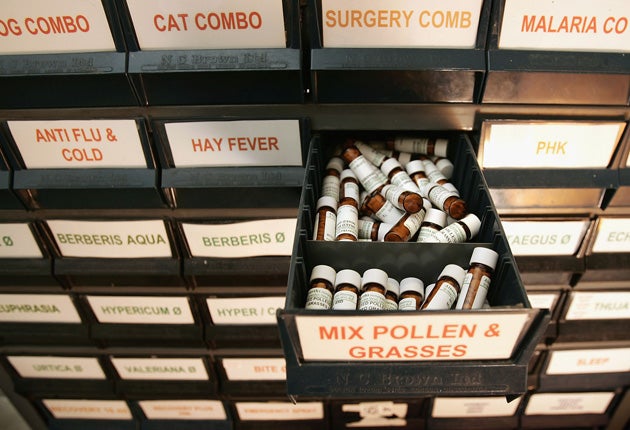Government ignored our advice on homeopathic remedies, say experts
Treatments still funded on NHS despite lack of proof that they work

The coalition Government ignored scientific advice on the questionable nature of homeopathy by continuing to allow the NHS to fund homeopathic treatment despite there being next to no evidence that it works, leading scientists have told The Independent.
Last week, health ministers refused calls from the House of Commons science and technology committee to stop the NHS funding homeopathic treatment on the grounds that such a ban would limit patient choice and contradict the Government's stated aim of devolving more power to the Primary Care Trusts (PCTs) of the NHS.
However, the Government's own chief scientific adviser, Sir John Beddington, said that he had spoken informally to coalition ministers about his grave concerns about homeopathy and the Department of Health's policy of allowing it to be prescribed under the NHS.
"I remain of the view that the evidence of efficacy and the scientific evidence base of homeopathy is highly questionable. It is vitally important that the public can make informed choices on their use of homeopathy, so the evidence base must be freely available in an easily-accessible format," Sir John said.
The Government does not know how many PCTs prescribe homeopathic treatment or how much it costs but the total annual funding is believed to run into millions of pounds. Earlier this year, the Commons' science committee recommended that the NHS should stop funding homeopathy on the grounds that it is a waste of money and it gives patients the false impression that such treatment works.
"When the NHS funds homeopathy, it endorses it. Since the NHS Constitution explicitly gives people the right to expect that decision on the funding of drugs and treatments are made 'following proper consideration of the evidence', patients may reasonably form the view that homeopathy is an evidence-based treatment," the select committee's report said.
In its response to the report, the Government said that it will keep the position on NHS funding under review. "However, we believe that providing appropriate information for patients should ensure that they form their own views regarding homeopathy as an evidence-based treatment," it said.
Scientists point out, however, that if patients are told clearly that there is no credible evidence to support homeopathic treatments, this may undermine the only benefit that homeopathy is likely to provide, namely the well-established "placebo effect" where someone feels and gets better because they believe a treatment is working.
"Doctors are not allowed to prescribe an honest placebo, even if they think that is the best they can do for the patient. But they are allowed to prescribe a dishonest placebo by referring the patient to a homeopath," said Professor David Colquhoun, a pharmacologist at University College London.
"Certainly you may feel better after the pill, because you were getting better anyway, or because of the placebo effect. That can't justify your doctor giving a pill that contains nothing whatsoever," Professor Colquhoun said.
"If there is no evidence that homeopathy works beyond the placebo effect, why does the Government pay for it? The answer given to that is 'patient choice'. I dare say the patient would cheer up if the NHS paid for a bottle of Chanel No 5," he said.
Professor Edzard Ernst, a specialist in complementary medicine at the Peninsula Medical School in Exeter, said: "If the Government is serious about putting patient choice over evidence, it not only displays a profound misunderstanding of both these issues but should then also give cream cakes to diabetics and cigarettes to someone with a lung disease."
Evan Harris, a former Liberal Democrat MP who sat on the science select committee when it carried out its inquiry, said that the decision to continue NHS funding homeopathy by the Government is not a good start for the health secretary Andrew Lansley.
"How does the Government justify allowing treatments that do not work to be provided by the NHS in the name of choice, when it allows medicines which do work to be banned from NHS use?" Dr Harris said.
Homeopathy in numbers
1796 The year in which a German physician called Samuel Hahnemann came up with the idea that "like cures like"
£4m Estimated amount spent on homeopathic treatments by the NHS each year
1,500 Approximate number of registered homeopaths in Britain
£150 Typical cost of an initial consultation with a homeopath
0% Usual amount of active ingredient contained in each homeopathic remedy
Join our commenting forum
Join thought-provoking conversations, follow other Independent readers and see their replies
Comments